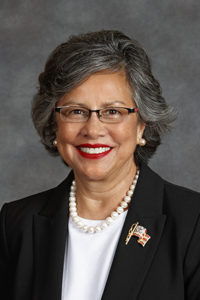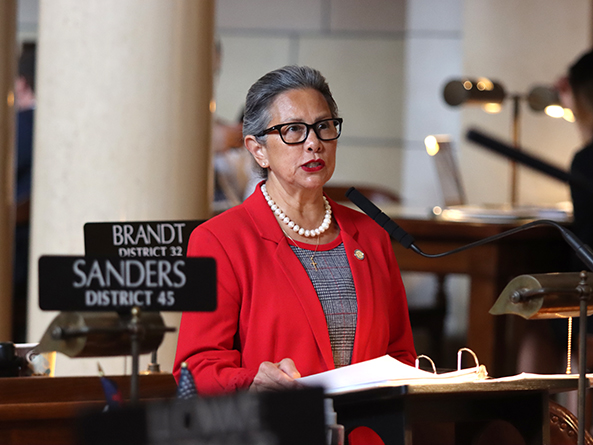Omnibus government regulation bill clears first round
A proposal meant to clarify procedures for interpreting state laws and regulations was amended to include provisions of several additional bills and advanced to select file Jan. 23.

LB43, as introduced by Bellevue Sen. Rita Sanders, would direct hearing officers and judges not to rely on a state agency’s interpretation of state laws or regulations in contested cases under the Administrative Procedures Act.
Sanders said the goal is to focus more on the legislative intent behind laws and less on agency interpretations in situations involving disputes over state agency actions. Deferring to state agency interpretations often serves to enhance the power of an unelected bureaucracy, she said.
“In our system of government, it’s important for the Legislature — the people’s branch of the government — to say what it means when granting authority to executive branch agencies,” Sanders said.
A Government, Military and Veterans Affairs Committee amendment, adopted 37-0, added the provisions of five additional bills that address the state’s Administrative Procedures Act and Public Records Act.
Gordon Sen. Tom Brewer, chairperson of the committee, said the measures focus on shielding Nebraskans from government overreach, protecting religious freedom, improving government transparency and protecting the state’s “cyberspace” efforts through changes to public records laws.
Included in the amendment are provisions of Brewer’s LB277, which would adopt the First Freedom Act. The act would create a more restrictive standard for imposing a “substantial burden” on a person’s right to the exercise of religion. Any such religious restriction would have to be essential to the furtherance of a compelling state interest and be administered by the least restrictive means possible.
The act would not apply to government actions taken in an emergency as long as restrictions on religious practice are not greater than those placed on non-religious organizations and businesses. It also would provide a legal cause of action for a person whose exercise of religious freedom has been subject to an undue restriction.
Brewer said the provisions would address situations such as when the government placed greater restrictions on the operation of churches than businesses during the height of the COVID-19 pandemic.
“They should be on the same playing field,” he said.
LB277 also contains provisions that would authorize indigenous tribal members who are students in approved or accredited public schools to wear tribal regalia — including garments, jewelry and other adornments or traditional objects of cultural significance — at any school facility or function, unless doing so would prevent school purposes or interfere with the educational process.
Omaha Sen. John Cavanaugh expressed concern regarding provisions of LB277 related to the First Freedom Act, which he said could be used to challenge important existing government protections.
He offered an amendment to clarify that the provisions could not be used to challenge any provision of law that provides protections against discrimination or the promotion of equal opportunity.
“It’s important that this bill be a shield to protect the religious freedom rights of people and not a sword to challenge well-settled nondiscrimination law or employment protections,” Cavanaugh said.
Sen. John Fredrickson of Omaha said he fully supported LB277’s provisions protecting students’ right to wear tribal regalia, calling the history of discrimination against Native American students long and “very cruel.”
He expressed concerns, however, regarding the way in which claims of infringement upon religious freedoms recently have been “weaponized” against the LGBTQ community in ways that he described as “far beyond an expression of simple religious faith.”
Cavanaugh withdrew his amendment before a vote was taken, saying he hoped to continue working on the bill before the next round of debate.
Other provisions
Also included in the committee amendment are provisions of LB366, sponsored by Sen. Danielle Conrad of Lincoln, which seek to improve the process for fulfilling information requests under the state’s Public Records Act.
The measure would differentiate between Nebraska residents and nonresidents when applying a fee structure for requests — but all news media would be considered residents for fee purposes. Currently, Nebraska residents may be charged for time spent fulfilling a request beyond the first four hours. Conrad’s proposal would change that threshold to eight hours and allow nonresidents to be charged the full cost of fulfilling a request.
In addition, it would require that any claim that a request requires more than four days to fulfill be “attested to under oath” before being provided in writing to the requester.
Conrad said the provisions represent a “long overdue” update of Nebraska’s public records law and seek to prevent a continued “tamping down” of citizens’ right to know what the government is doing in their name and with their tax dollars.
“It was once very simple and straightforward to get information about what government was up to and it’s become increasingly difficult,” she said.
A provision originally in LB366 that would have provided that police body camera video of an in-custody death be considered a public record after the conclusion of a required grand jury proceeding was removed by the committee amendment.
Also included are provisions of LB297, sponsored by Sanders, that would prohibit state and local government agencies from compelling a nonprofit organization to release the personal information of its members, supporters, volunteers or donors.
The provisions would not apply to legally required disclosures under the Nebraska Political Accountability and Disclosure Act or for use in criminal or civil investigations. The committee amendment adds exceptions related to evaluation of applications for occupational and facility licenses and criminal history checks and includes a damages maximum of $2,500 per violation.
Sanders said there recently has been a nationwide push to mandate disclosure of the personal information of nonprofit donors in order to “target” people based on their beliefs. She said such measures infringe on individual First Amendment rights and that nonprofits should be able to keep donor information confidential.
Finally, the amendment includes provisions of two additional proposals. LB650, introduced by Omaha Sen. Mike McDonnell, would amend public records law to permit withholding by the state or any political subdivision of records relating to the “nature, location or function of cybersecurity.”
LB41, sponsored by Sen. Ben. Hansen of Blair, would prohibit the state from placing “intrusive or politically motivated” filing or reporting requirements on charitable organizations beyond those required by state law unless narrowly tailored to serve a compelling state interest or to fulfill federal funding requirements.
Following adoption of the committee amendment, senators advanced LB43 to select file on a 37-0 vote.


